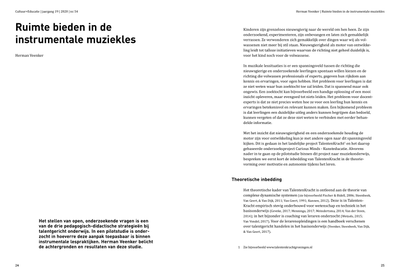Het stellen van open, onderzoekende vragen is een van de drie pedagogisch-didactische strategieën bij talentgericht onderwijs. In een pilotstudie is onderzochtin hoeverre deze aanpak toepasbaar is binnen instrumentale lespraktijken. Herman Veenker belicht de achtergronden en resultaten van deze studie.
DOCUMENT

Introduction: Depression can be a serious problem in young adult students. There is a need to implement and monitor prevention interventions for these students. Emotion-regulating improvisational music therapy (EIMT) was developed to prevent depression. The purpose of this study was to evaluate the feasibility of EIMT for use in practice for young adult students with depressive symptoms in a university context. Method: A process evaluation was conducted embedded in a larger research project. Eleven students, three music therapists and five referrers were interviewed. The music therapists also completed evaluation forms. Data were collected concerning client attendance, treatment integrity, musical components used to synchronise, and experiences with EIMT and referral. Results: Client attendance (90%) and treatment integrity were evaluated to be sufficient (therapist adherence 83%; competence 84%). The music therapists used mostly rhythm to synchronise (38 of 99 times). The students and music therapists reported that EIMT and its elements evoked changes in all emotion regulation components. The students reported that synchronisation elicited meaningful experiences of expressing joy, feeling heard, feeling joy and bodily responses of relaxation. The music therapists found the manual useful for applying EIMT. The student counsellors experienced EIMT as an appropriate way to support students due to its preventive character. Discussion: EIMT appears to be a feasible means of evoking changes in emotion regulation components in young adult students with depressive symptoms in a university context. More studies are needed to create a more nuanced and evidence-based understanding of the feasibility of EIMT, processes of change and treatment integrity.
DOCUMENT

Ouderen die voor het eerst een instrument leren bespelen, blijken daar heel goed toe in staat te zijn. En muziek maken heeft ook nog eens een gunstig effect op het welzijn en de cognitieve vermogens van ouderen. De groeiende vergrijzing van onze samenleving en het gegeven dat ouderen langer gezond blijven maakt dat muziekles geven aan ouderen een vak in ontwikkeling is. Een vak dat kansen biedt voor de professionele muziekdocent. Hoe beïnvloeden muziek en de kunsten het proces van gezond ouder worden? Deze vraag wordt vanuit diverse invalshoeken onderzocht door het lectoraat Lifelong Learning in Music binnen de onderzoekslijn Healthy Ageing through Music & the Arts. De informatie die met Ouderen en Muziek werd verzameld is samengebracht in een Kennisbank die voor iedereen is te raadplegen op ww.hanze.nl/ouderenenmuziek Er bestaan nog vele vragen over het op een effectieve manier muziekles geven aan ouderen en over hoe je deze gevarieerde groep het beste kunt benaderen. In samenwerking met muziekdocenten uit de noordelijke regio is het lectoraat Lifelong Learning in Music met het onderzoeksproject Ouderen en Muziek op zoek gegaan naar mogelijke antwoorden op deze vragen. De resultaten zijn samengevat in deze brochure. De inhoudelijke lijn van het project wordt bewaakt door het Consortium Ouderen en Muziek.
DOCUMENT

Brochure about the Meaningful Music in Health care (MiMiC) practice.
MULTIFILE

Uit eerder onderzoek van het lectoraat Lifelong Learning in Music weten we dat in contact komen met muziek, en muziek maken van grote betekenis kan zijn voor het welzijn van mensen met dementie. In het project ‘Muziek in het Odensehuis’ stond niet alleen de rol van muziek voor mensen met dementie centraal maar ook de betekenis die het werken met mensen met dementie kan hebben voor de musici zelf.Het Odensehuis Groningen is een inloophuis voor mensen met beginnende dementie en hun naasten in de Korrewegwijk in Groningen. Het project had als doel een duurzame muziekpraktijk te starten in de Korrewegwijk waarbij musici woonachtig of werkzaam in de wijk structureel betrokken zijn bij het Odensehuis. Alumni en studenten van het Prins Claus Conservatorium componeerden en musiceerden in het najaar van 2015 drie maanden lang met de deelnemers van het Odensehuis. De groep deelnemers bestaat uit bezoekers van het huis, vrijwilligers en personeel. De composities werden uitgevoerd in het Odensehuis, op het Prins Claus Conservatorium en tijdens een ouderenfestival in het Groninger Forum.Deze brochure geeft inzicht in een aantal sleutelmomenten van het project en presenteert de belangrijkste thema’s en resultaten van het praktijkgerichte onderzoek dat aan het project gekoppeld was.
DOCUMENT

A musical improvisation inspired by a beautifulsummer day or by a song by Elvis; for patientsadmitted in hospital for an operation, music canhave healing powers. With the research projectMeaningful Music in Health Care (MiMiC), thattook place from autumn 2015 until 2018, the researchgroup Lifelong Learning in Music (LLM), togetherwith the department of surgery of the UniversityMedical Center Groningen (UMCG), researched thepractice of live music for hospital patients and theirhealth care professionals. For the research groupLifelong Learning in Music the focus of the researchwas on the meaning of this musical practice formusicians and health care professionals, and onthe development of this practice.The research of UMCG concentrated on the effectsof live music on the recovery and wellbeing of patients
DOCUMENT

Gastredacteur van het themanummer 'Curious Minds - Kunsteducatie' van het tijdschrift Cultuur+Educatie
DOCUMENT

In elke les kan het voorkomen dat leerlingen niet meer weten hoe ze verder moeten. Dat geldt eens te meer voor kunstlessen, waarin routes naar een oplossing minder vast liggen. Hoe kan de leerkracht hen weer op weg helpen? In dit artikel verkennen Ineke Haakma, Linda Hendriks en Henderien Steenbeek aan de hand van twee casussen de mogelijkheden van scaffolding in kunstlessen.
LINK
In het project Curious Hands doen Vanessa van’t Hoogt en Imka Buurke onderzoek naar manieren om maakonderwijs een centralere plek te geven op scholen. Bij leren maken is de balans tussen structuur en ruimte geven cruciaal. In deze bijdrage belichten de onderzoekers de eerste bevindingen uit twee pilotstudies bij werkplaatsen van Academie Minerva en E-labs in het voortgezet onderwijs.
DOCUMENT
